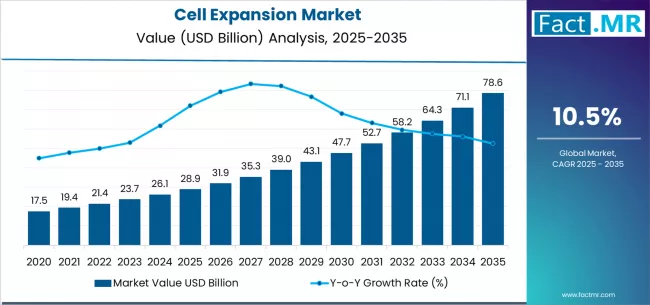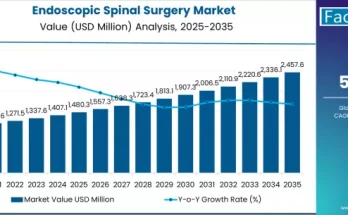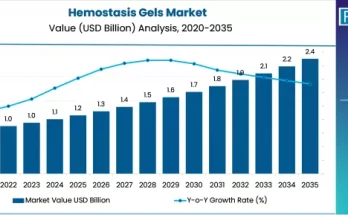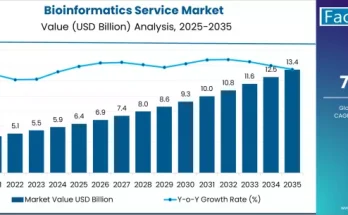The cell expansion market is emerging as a critical pillar of the biotechnology and biopharmaceutical industries. As cell therapies, regenerative medicine, and advanced biologics continue to advance, the need to reliably and scalably grow cells is more important than ever. This market serves as the backbone for producing the cellular biomass needed for therapeutic applications, research, and industrial bioprocessing, making it a key enabler of tomorrow’s healthcare breakthroughs.
What Is the Cell Expansion Market?
At its core, cell expansion refers to the processes and tools used to grow and multiply cells in a controlled environment. These processes span from laboratory‐scale culture flasks and reagents to large bioreactors, automated systems, and consumables. Cell expansion is foundational for applications that require large numbers of cells, whether for producing monoclonal antibodies, engineering cell therapies, or making vaccines.
Driving Forces Behind Market Growth
One of the strongest drivers in this space is the expanding pipeline of cell-based therapies. As more treatments based on engineered T-cells (like CAR-T therapies), stem cells, and other advanced modalities move through development, scaling up production becomes a crucial challenge. Cell expansion technologies help address this by offering scalable platforms that can reliably produce the required cell quantities under strict quality controls.
Another significant factor is the rapidly growing demand for biologics. Therapeutic proteins, monoclonal antibodies, and recombinant constructs often originate from cultured cell lines. To meet the increasing global demand for these biologics, efficient and scalable cell expansion is indispensable.
Furthermore, the push for regenerative medicine—such as tissue engineering and cell therapy for degenerative diseases—is fueling investment in expansion systems. These systems enable not just quantity, but also quality, ensuring cells retain functionality and safety after proliferation.
Automation and process optimization also play a major role. Advanced bioreactors, single-use platforms, and real-time monitoring technologies reduce manual effort and contamination risk, while boosting reproducibility. The integration of AI and machine-learning into these systems is starting to optimize culture conditions dynamically, which promises significant gains in yield and consistent cell behavior.
Key Market Segments
To fully understand the cell expansion market, it helps to look at how it’s divided:
- By Product Type:
- Consumables: These include culture media, growth reagents, sera, and other essential ingredients needed for keeping cell cultures healthy and proliferating.
- Instruments: Automated bioreactors, cell counters, centrifuges, and systems for monitoring culture environments fall into this category.
- Culture Flasks & Accessories: Traditional vessels, single-use flasks, and other labware that support manual or semi-automated cell growth.
- By Cell Type:
- Mammalian Cells: These dominate many high-value applications, especially in therapeutic protein production and cell therapies.
- Microbial Cells: Used in biologics production, fermentation, and recombinant protein expression systems.
- Others: Including specialized cells used in research, tissue engineering, or novel therapy development.
- By Application:
- Biopharmaceutical Production: Growing cells to generate proteins, antibodies, or viral vectors.
- Vaccine Production: Expansion of cells that produce vaccine components, like viral antigens or recombinant proteins.
- Tissue Culture & Engineering: Generating cellular scaffolds or engineered tissues.
- Drug Development: Supporting research, screening, and testing of new therapeutic molecules.
- By End-User:
- Biopharmaceutical & Biotechnology Firms: These are major customers, requiring large-scale cell expansion for manufacturing biologics.
- Research Institutions: Universities and labs that rely on expanded cell lines for fundamental science or preclinical work.
- Cell Banks: Organizations that maintain stable cell lines and need robust expansion techniques.
- Other: Including contract manufacturing organizations (CMOs), hospitals, and diagnostic centers.
Regional Dynamics
The cell expansion market is growing globally, with key leadership from North America, Asia Pacific, and Europe. In North America, advanced infrastructure, mature biotech firms, and supportive regulatory frameworks are fueling demand. Asia Pacific is emerging as a high-growth region, driven by government investment in biomanufacturing capacity, expanding biotechnology ecosystems, and increasing adoption of cell therapies. Europe, with its strong pharmaceutical base, is also actively investing in cell expansion technologies, especially for contract manufacturing and cell therapy production.
Challenges in the Market
Despite the promising outlook, the cell expansion industry faces several challenges:
- Cost of Scaling: Expanding cells at industrial scale is expensive. Bioreactor systems, single-use consumables, and high-quality media contribute to high operating costs.
- Quality Control: Maintaining consistent cell characteristics (e.g., viability, phenotype, functionality) across large batches is difficult and critical for therapeutic use.
- Process Complexity: Developing efficient protocols for expansion without inducing genetic or functional drift in cells demands deep expertise and optimized systems.
- Regulatory Hurdles: Cell therapies and biologics face stringent regulatory scrutiny. Cell expansion processes must comply with GMP standards, and validation of every production lot is mandatory.
- Workforce Gap: Skilled professionals who understand both cell biology and bioprocess engineering are limited, which can impede scale-up and commercialization.
Key Trends to Watch
- Rise of Single-Use Technologies: Disposable bioreactors and consumables reduce contamination risk and cleaning burden, making scaling more straightforward.
- Automation & Digitalization: More facilities are adopting automated expansion systems with integrated sensors, real-time analytics, and AI-based process control.
- AI-Driven Optimization: Machine learning models are being used to predict optimal media formulations, feeding strategies, and environmental conditions for better cell yield and quality.
- Hybrid Expansion Platforms: Combining the benefits of traditional flask-based culture with bioreactor systems to balance cost, scalability, and control.
- Strategic Collaborations: Partnerships between biotech firms, equipment manufacturers, and contract development organizations are accelerating innovation and adoption.
Major Players in the Market
The competitive landscape includes well-established life-sciences companies and specialized bioprocessing firms. Key players include Thermo Fisher Scientific, Corning, Merck, Miltenyi Biotec, BD (Becton, Dickinson & Co.), Sartorius, Takara Bio, and others. These companies are investing in consumables, instruments, and integrated platforms to stay ahead in this rapidly evolving market.
Why the Cell Expansion Market Matters
The expansion of cells is more than just a step in manufacturing — it’s a foundational capability that underpins the future of medicine. Whether it’s powering the production of cutting-edge cell therapies, enabling large-scale biologic manufacturing, or supporting regenerative treatments, robust cell expansion technologies are essential. As demand for advanced therapies grows, so does the importance of scalable, efficient, and high-quality expansion platforms.
For biotech companies, research institutions, and manufacturing players, staying plugged into the cell expansion market is a strategic necessity. Investing in optimized expansion systems now can pay dividends in the form of faster development, lower costs, and more reliable production.
Browse Full Report – https://www.factmr.com/report/cell-expansion-market



